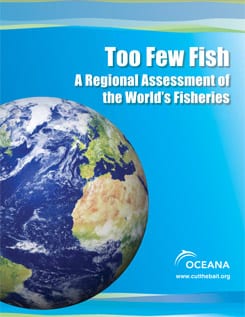Too Few Fish: A Regional Assessment of the World’s Fisheries
 A 2008 report by Oceana revealed that at most, 17% of the world’s fisheries should be considered capable of any growth in catch at all. The upward trend of global marine fish catch has begun to decline, suggesting the maximum long term potential of the world marine capture fisheries has been reached. There is no hidden reserve; the world’s oceans are in trouble.
A 2008 report by Oceana revealed that at most, 17% of the world’s fisheries should be considered capable of any growth in catch at all. The upward trend of global marine fish catch has begun to decline, suggesting the maximum long term potential of the world marine capture fisheries has been reached. There is no hidden reserve; the world’s oceans are in trouble.
The majority of the world’s fisheries are exploited at or beyond their maximum sustainable potential.
- Of the stocks with a known status, 77% are at a level that cannot withstand increased fishing activity.
- In six FAO regions, at least 85% of stocks are already fully fished or overfished, with the Western Indian Ocean and Northeast Atlantic stocks at a level of 100% exploitation.
Continued fishing on a fishery with an unknown stock status could lead to the depletion of the resource before it’s too late.
- Approximately 24% of the world’s fisheries have an unknown status suggesting there is not enough information for further expansion.
- More than 25% of the fisheries in the Western Central Pacific are of an unknown status, yet there is rapid and continued development of the fisheries with the addition of fishermen and gear.
- Major emerging fishing grounds, including the Southern Oceans, Western Indian Ocean, and Southern Atlantic Ocean, have large numbers of fish stocks with unknown status, ranging from more than 50 percent to nearly 75 percent of their stocks.
- Many of the areas with a large percentage stocks with an unknown status also have a high proportion of stocks that are overexploited, suggesting the unknown stocks may be at risk of overexploitation as well.
Reductions in effort and catch need to be included as part of a fisheries management regime.
- Even though the Mediterranean and Black Sea appear to be the most stable area in terms of catch, the region is still experiencing a decrease in their most valuable fishery resources.
- Countries with relatively strong management regimes still have difficulty enforcing their measures, as seen in South Africa where more abalone were confiscated illegally than landed in the legal fishery.
- Reduction in fishing effort in some areas, such as the East China and Yellow Seas, is considered urgent.
The decline in fisheries not only affects the economy, but the oceans.
- The decline in top major predators has forced fishermen to fish down the food chain.
- The loss of dominant species alters the catch composition leading to unpredictable consequences for the oceans.
Methods:
This report provides a global picture of the inability for future growth in the world’s fisheries. Based on FAO data and reports, the state of the world’s fisheries are provided, followed by a region by region analysis illustrating the need to reduce effort in the world’s fisheries.



